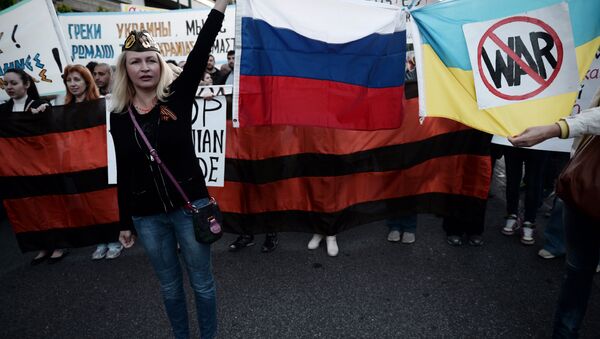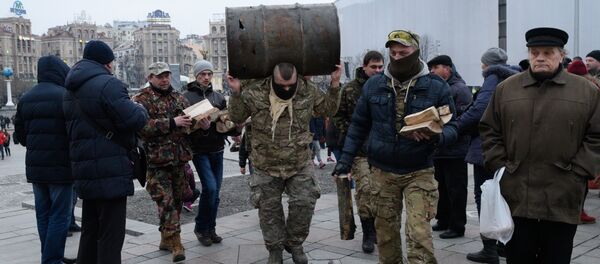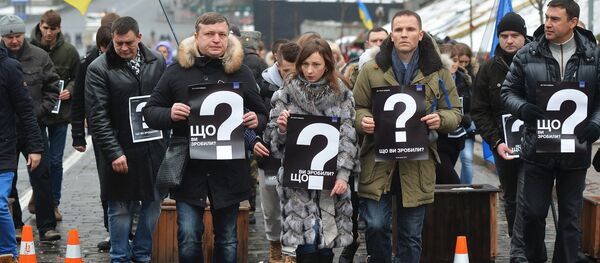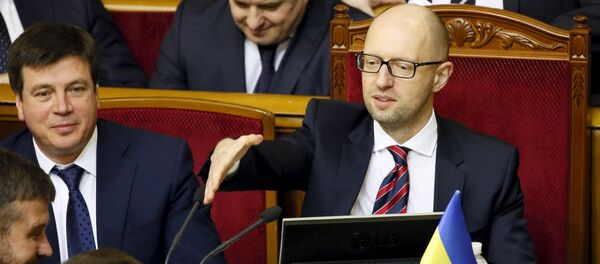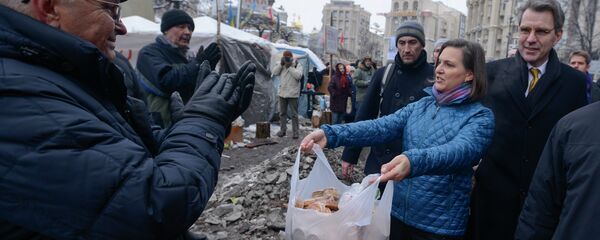At the same time, 36% of respondents answered 'generally bad' or 'very bad', up from 31% last year.
Moreover, two years after the events of the Euromaidan, which brought to power a nationalist government eager to separate itself politically, economically, and socio-culturally from Russia and to join the European Union, a majority of respondents continue to characterize the events negatively.
34% of respondents said that the events of February 2014 can best be characterized as 'anarchy, lawlessness and banditism', with 18% saying that the events amounted to a 'coup d'état, the forceful seizure of power', 12% describing it as a 'civil war', 6% as a 'rebellion/revolution' and 5% as an 'American provocation, Western interference'. 4% answered that it was a positive 'overthrow of the government'.
Ultimately, the results also showed that 81% of Russians believe 'Ukraine lost out' as a result of the Euromaidan revolution, with another 10% saying that 'factually, it didn't change anything', and only 2% suggesting that 'Ukraine benefited', down from 3% this time last year and 5% in March 2014. Moreover, a whopping 96% of Russians said they would not like to see 'a repeat of events analogous to Ukraine's Maidan' in Russia.
Commenting on the poll results, the independent Russian newspaper Svobodnaya Pressa suggested that unfortunately, "the current authorities of Ukraine have placed their bets on breaking off economically and, more importantly, culturally from Russia, — in favor of a break in all historical ties."
"Such policy, the newspaper contends, "has gradually begun bearing its fruit, mirroring Russians' attitudes toward Ukraine, which, until very recently was customary to consider a brotherly nation."
Asked to explain the poll results, the newspaper turned to Sergei Kara-Murza, respected sociologist and director of the Moscow-based Center for Problem Analysis and State Management Design.
"I would not call Russians' responses to sociologists regarding Ukraine 'convictions'," Kara-Murza said. "Rather, it would be more correct to call them 'sentiments'. Convictions are something stable and deeply held, while sentiments fluctuate depending on events."
In the long historical view, Kara-Murza says, the recent rift between Russia and Ukraine is not so catastrophic. "What has happened over the last two years does not yet indicate a fundamental shift," a point of no return.
"It's true, mass public sentiment in Ukraine is currently anti-Russian. This is similar to what happens when small conflicts take place between neighboring ethnic groups. They result in sharp outbreaks of hatred for other peoples, and this translates into bloody conflicts. Something similar can happen in large nations. Social scientists call this neo-tribalism – a phenomenon which occurs when large nations face such irrational attitudes in relation to their closes neighbors."
"But as anthropologists say, this type of conflict quickly burns itself out. I think that something similar is occurring between Russians and Ukrainians. In the future, relations between our nations, even if they are not very good, will gradually improve – realities will force this to happen. It's obvious that no one is going to accept Ukraine into Europe," the sociologist notes.
Asked how long Russia might have to wait for Ukraine to come around, Kara-Murza suggested that Russians should simply recall their own recent history.
"I think that their illusions will soon be lifted. All this is reminiscent of the mood in Russian society in the early 1990s. We believed that we would be entering our new 'common European home', that we would be given help, etc. The urban population was very idealistically-minded. But by 1994, this mood was exhausted. The same polls by VTsIOM, if one looks into the archives, confirm this, and I think the same thing will happen in Ukraine."
"In the late 1980s," Kara-Murza recalled, "Ukraine was the most 'pro-Union' republic in the Soviet Union. No one took Banderites, of whom there was only a handful, with any seriousness. This shows how people's sentiments can be changed. But convictions can be changed only through generations."
Ultimately, the sociologist notes, if the current anti-Russian authorities in Kiev were able to hold on to power for decades, new generations of Ukrainians could be convinced that Russians are not a fraternal nation, but their enemy. If this were to occur, he warns, "it would be difficult to correct, because children brought up in a certain way usually keep their beliefs for life."
The question Kara-Murza seems to suggest, is whether the Russophobic authorities in Kiev will be able to hold on that long.

